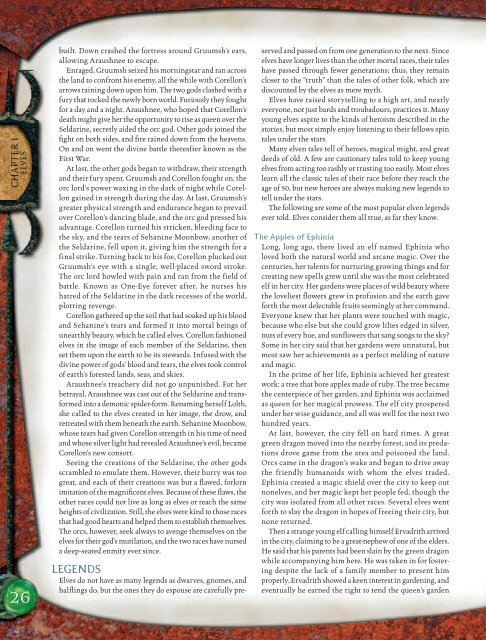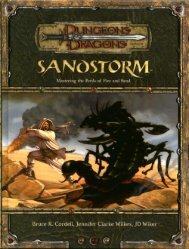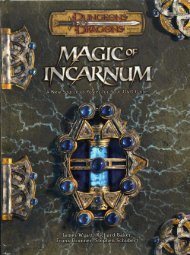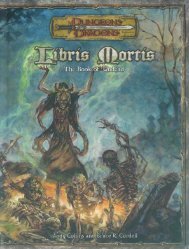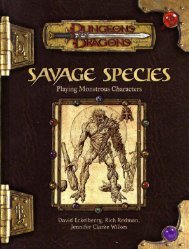CHAPTER 2HALFLINGS50away from their clans and caravans. Such loner halflingsare <strong>of</strong>ten adventurers, and most fall in with other adventurers<strong>of</strong> different races. These associations can last for manyyears, and a loner halfling <strong>of</strong>ten forms fast friendships withall his companions.Other loner halflings choose to make their own way in thecities or towns <strong>of</strong> other races. Many gravitate to human cities,where they function as thieves, burglars, or entertainers. Someset up their own shops, <strong>of</strong>fering goods to the public—andclandestine aid to other halflings. A few loner halflings wanderthe wilderness on their own, living <strong>of</strong>f the land and makingfriends with the outcasts and loners <strong>of</strong> other races.Elderly halflings who have tired <strong>of</strong> the traveling life mayalso become loners, purchasing homes or land and settlingdown to retire. Such landed halflings frequently allow otherhalflings to stash goods and money on their property andhide out there when the heat is on.SETTLED HALFLINGSAlthough halflings prefer to wander, some permanent settlementsdo exist. These are <strong>of</strong>ten founded on land belongingto a member <strong>of</strong> some other race who owes the founders agreat favor. Typically in such a case, the owner grants thehalfling race permission to use the land in perpetuity, andits ownership passes to the leaders <strong>of</strong> the halfling town free<strong>of</strong> charge should any new owner ever wish to sell the originalowner’s lands.Such halfling settlements are rarely bigger than smalltowns, because few halflings truly wish to settle down. Theirorganization typically mirrors that <strong>of</strong> the closest settlement<strong>of</strong> some other race; they expect to have the most contact withpeople from that community and want them to feel comfortable.Each town does, however, have clan leaders, an old one,a blacksmith, a chief herder, and at least one priest, all <strong>of</strong>whom function as they would in a caravan (see above).Halflings who live in a settled community usually growcrops in addition to raising herd animals. Orchards andcultivated fields dot the surrounding area, and most settledcommunities are renowned for their simple pastoral beauty.Houses are usually built <strong>of</strong> the most common material in thearea, wooden structures and earthen dwellings being themost prevalent.The residents <strong>of</strong> a settled community apprentice theiryoung in the same manner that caravan halflings do, butthe choices <strong>of</strong> pr<strong>of</strong>ession are <strong>of</strong>ten more numerous in a community.Every kind <strong>of</strong> artisan and merchant is represented ina halfling settlement, though they need not all be halflings.Butchers, bakers, jewelers, metalworkers, candlemakers,wainwrights, animal breeders and trainers, tinkers, potters,cobblers, weavers, seamstresses, and purveyors <strong>of</strong> magic itemsall have shops, and at least two taverns operate in any suchtown. Just about any service available in a human communityis available in a halfling settlement.The typical halfling settlement includes a school whereyoung halflings can gain some book learning and a school<strong>of</strong> magic where those who desire to do so can train in thearcane arts. A temple to each <strong>of</strong> the major halfling deities ison hand as well.Each community also has a “banker” and a fence. The latterbuys stolen goods from itinerant halflings and resells themin safe locations. The banker caches money from wanderinghalflings and keeps it safe until they return, charging a smallfee for the service.HALFLINGS ANDOTHER RACESHalflings are generally amiable creatures, and they formfast friendships with people who have earned their respect.Obviously foolish individuals <strong>of</strong> any race earn only theirscorn, but those who prove their worth by aiding a halflingor by seeing through one <strong>of</strong> her schemes is a candidate forlong-term friendship. Many a prospective mark’s ire has beenturned aside when the halfling who was trying to cheat himburst out into laughter and bought him a drink.For the most part, halflings are quite tolerant <strong>of</strong> otherraces. They value their own ways and assume that othersvalue theirs just as much. “Do what you like as long as youdon’t get caught,” goes an old halfling saying, and mosthalflings are quite happy to extend that same concept toother races as well.Dwarves: Halflings admire dwarves for their industriousnessand their strong family ties, both qualities that resonatethrough the halfling culture as well. Dwarves also have anose for money, so allying with them on small-scale treasurehunts can be quite pr<strong>of</strong>itable.Like anyone else who lives in the same place all his life, thetypical dwarf is rather stodgy and more than a little provincial.Dwarves are also a bit too warlike for the halflings’ taste.Why can’t they just learn to get along with everyone else, likethe halflings do? They’re not even content with making theirown wars—they’re always trying to teach halflings how t<strong>of</strong>ight too. It’s best just to ignore them when they act arrogantand overbearing. They can’t help it, after all; it’s just the waythey are.Elves: Halflings are somewhat in awe <strong>of</strong> elves and theirhigh civilization. Elves live so long and see so much thathalflings tend to feel a bit inferior around them, like awkwardyounger siblings. Thus, they try to be on their verybest behavior around elves, and they tend to suppress theirrambunctious nature and their open, friendly charm. Onlywhen they have lived near elves for periods extending intoyears do they fully come out <strong>of</strong> their shells.In spite <strong>of</strong> their discomfort around elves, halflings appreciatethe fact that elves get along with most other races, andthey are also impressed by the fact that elves try their bestto avoid warfare through negotiation. Halfling caravansfrequently make camp near elf lands; the elves are almostalways kind and welcoming, as though they were actuallyglad to see their smaller friends. When elves purchase theirgoods or ask for help with particular ventures, halflings aregenerally flattered and only too glad to be <strong>of</strong> assistance.
Gnomes: Gnomes are kindred spirits and fellow littlepeople. As such, they’re made-to-order allies for halflings.And if those considerations weren’t enough to make visitingthem fun, they’re also good wizards and fabulous singers.Having a gnome bard join in the evening song around thecampfire is a real treat.However, gnomes are strangely short-tempered creatures.They can be chatting pleasantly one minute and shouting thenext. They also seem easily frustrated, getting worked up overthe smallest things. Perhaps they’ve developed bedsores orsomething from sitting in one place all the time.Half-Elves: Half-elves are just like elves but less so. Theyhave the same grace and charm in a halfling’s eyes, but theirdemeanor isn’t as intimidating as that <strong>of</strong> a full elf’s. Half-elveslive much shorter lives, so they’re not always talking aboutthings that happened hundreds <strong>of</strong> years ago. This tendencyto live in the here and now tends to endear them to theirhalfling companions.Half-elves have all the charm <strong>of</strong> their elf parents, coupledwith a respect for the ways <strong>of</strong> others that can come onlyfrom being part <strong>of</strong> more than one culture. They’re as goodat negotiating for what they need as halflings are, thoughmany <strong>of</strong> them have a troubling honest streak. They’re alsoindividualists, each different from the others, and eachinteresting in her own way. All these factors make them realkindred spirits, though they’re a little too tall.Half-Orcs: In general, halflings consider half-orcs stronglike bulls—and dumb like bulls. They tend to make goodmarks for confidence games and even theft, but woe to thehalfling who is caught. Half-orcs are the least susceptible tohalfling charm and wit <strong>of</strong> all the other races.On the other hand, it’s nice to be on the good side <strong>of</strong> a halforcwhen a strong sword-arm is needed. Maybe half-orcs don’talways get the more subtle jokes, but they can appreciate themore obvious kinds <strong>of</strong> humor that few others do. Of course,any halfling who can get a half-orc to laugh almost alwaysgets a free drink for the effort.Humans: Halflings enjoy the company <strong>of</strong> humans morethan that <strong>of</strong> any other race. Endlessly adaptable and everchanging,they are very much like halflings in spirit. Halflingshave worked hard to cultivate their relationship with humansand ensure that they are always welcome in human settlements.To gain the enmity <strong>of</strong> the human race would deprivethe halflings <strong>of</strong> a significant area in which to roam, becausehumans hold more lands than any other race.Halflings consider humans big and go<strong>of</strong>y, but rather sweetin their own way. They’re smart and adaptable, they like totravel, and they can work hard when they want to. They’realmost as friendly as half-elves and a little bit gullible likehalf-orcs—a winning combination in any halfling’s book.Human settlements are good places for halflings to findwork, because humans always need something done. Oftenthis need stems from their odd tendency to declare war onone another, but that’s their own business. Even withouta war, they’re always creating—building, expanding, andinventing. Their societies are varied and always changing,and halflings who go to the same settlement a second timemay find its needs and outlook very different.Raptorans: To a halfling, a raptoran seems like a combination<strong>of</strong> an eagle and an elf. The raptorans’ cleverness and their abilityto fly fascinate the halflings, who can’t get enough <strong>of</strong> raptorans’stories about how it feels to have the wind in their faces.On the other hand, raptorans aren’t very good customers,since they hardly ever want to buy anything, and they usuallydon’t need to hire out any work. They also prefer that halflingscamp far away from their homes and not remain long if theydo pass through the area.Overall, halflings find raptorans a bit stand<strong>of</strong>fish, and seetheir need to give permission for camping on open land asludicrous. This practice, combined with the raptorans’ tendencyto consider proposals for a long time, leads halflings toconclude (incorrectly) that they can do anything they wish onraptoran land as long as they ask first. Such misapprehensionshave led to more than one clash between the two races.Roleplaying Application: The above generalizationsrepresent how an average halfling is likely to view someonefrom a given race. Since there are no average members <strong>of</strong>society, it’s up to you to decide how well these commentsfit your impressions <strong>of</strong> the individual. Does your characteradhere to the stereotypes presented above? If not, why not?Was there something in your character’s past that changedhis or her view <strong>of</strong> a given race from the status quo?RELIGIONMost halflings maintain a deep reverence for their owngods, and many temporarily adopt the worship <strong>of</strong> the deities<strong>of</strong> other nearby races as a matter <strong>of</strong> politeness. Wanderinghalflings also venerate a host <strong>of</strong> local nature spirits and lesserdeities that rule over particular forests, lakes, and marshes.They typically stop at the small shrines <strong>of</strong> such deities to payhomage, pray for a safe journey, and leave a bit <strong>of</strong> food for thelocal animals in the gods’ names.The halfling pantheon is led by Yondalla, who is alsorepresented in a different aspect by the deity known asDallah Thaun (see below). Other members <strong>of</strong> the pantheoninclude Arvoreen, Brandobaris, Cyrollalee, Sheela Peryroyl,and Urogalan, all <strong>of</strong> whom are described in detail in theFORGOTTEN REALMS® supplement Faiths and Pantheons. Briefgame information about each <strong>of</strong> these additional deitiesappears at the end <strong>of</strong> this section.Organized religious services occur rarely, usually only tocelebrate holidays and to solemnize certain rites <strong>of</strong> passage,such as births, weddings, and funerals. Most halflings neverset foot inside a temple except when they’re in a halflingsettlement, but they visit the wagon <strong>of</strong> the caravan’s cleric ordeacon whenever they feel the need for spiritual guidance.Offerings to the church are usually in the form <strong>of</strong> goods orfood, though halflings are happy to contribute coin for specialneeds, such as repairing a temple or building a new one.A halfling wedding requires a cleric <strong>of</strong> Yondalla to sanctifythe vows <strong>of</strong> the couple. At a funeral, a cleric or deaconCHAPTER 2HALFLINGS51
- Page 2: C R E D I T SD E S I G NSKIP WILLIA
- Page 7 and 8: no elf could predict which memory w
- Page 9 and 10: premium. Thus, each individual can
- Page 11 and 12: The elves have raised one form of e
- Page 13 and 14: do spend time away from one another
- Page 15 and 16: espects during this time, and those
- Page 17 and 18: Stores Master: Charged with keeping
- Page 19 and 20: would be the birthright of any full
- Page 21 and 22: of feet above the forest floor. Mos
- Page 23 and 24: Cleric Training: More than any othe
- Page 25 and 26: ELF HISTORYAND FOLKLOREThe elves cl
- Page 27 and 28: along with her son Hionyron, who wa
- Page 29 and 30: and return her to her people.” In
- Page 31 and 32: Table 1-3: Suffixesd% Suffix Meanin
- Page 34: CHAPTER 1ELVES34tri-level tree home
- Page 37 and 38: Illus. by C. Lukacsurious and activ
- Page 39 and 40: the reason for the farmer’s hospi
- Page 41 and 42: Halflings make a visitor feel welco
- Page 43 and 44: Halflings are usually pleasant trav
- Page 45 and 46: Halflings are as eager to experienc
- Page 47: A chief or elder heads each clan, c
- Page 52 and 53: CHAPTER 2HALFLINGS52Illus. by S. Wo
- Page 54 and 55: CHAPTER 2HALFLINGS54to tell how lon
- Page 56 and 57: CHAPTER 2HALFLINGS56the underbrush
- Page 58 and 59: CHAPTER 2HALFLINGSIllus. by T. Baxa
- Page 60 and 61: CHAPTER 2HALFLINGS60Donta muden sit
- Page 63 and 64: and one or more bedrooms. All have
- Page 65 and 66: Illus. by C. Lukacshe cliff-dwellin
- Page 67 and 68: Personality: Raptorans have a reput
- Page 69 and 70: PSYCHOLOGYSome outsiders who have h
- Page 71 and 72: for making a point through a logica
- Page 73 and 74: flock for debate, sometimes invitin
- Page 75 and 76: its eggs. At such times, they toler
- Page 77 and 78: THE RAPTORAN PANTHEONThe typical ra
- Page 79 and 80: Prayers: Prayers to the Stormfather
- Page 81 and 82: “Welcome, friend,” said a human
- Page 83 and 84: year since, and they share the care
- Page 85 and 86: D: Domain spell. Domains: Protectio
- Page 87 and 88: characteristics are summarized in t
- Page 90 and 91: CHAPTER 3RAPTORANS90Authority Figur
- Page 92 and 93: CHAPTER 4OTHERRACES92a humanlike ra
- Page 94 and 95: CHAPTER 4OTHERRACES94ment, finding
- Page 96 and 97: CHAPTER 4OTHERRACES96Illus. by S. B
- Page 98 and 99: Table 4-1: The CentaurHit Base Atta
- Page 100 and 101:
CHAPTER 4OTHERRACES100nomadic gnoll
- Page 102 and 103:
Table 4-2: The GnollBase Fort Ref W
- Page 104 and 105:
CHAPTER 4OTHERRACES104of the humano
- Page 106 and 107:
CHAPTER 4OTHERRACESsneak attack, bu
- Page 108 and 109:
CHAPTER 5PRESTIGECLASSES108Shadowda
- Page 110 and 111:
CHAPTER 5PRESTIGECLASSESIllus. by W
- Page 112 and 113:
CHAPTER 5PRESTIGECLASSES112the foll
- Page 114 and 115:
CHAPTER 5PRESTIGECLASSES114Entry Re
- Page 116 and 117:
CHAPTER 5PRESTIGECLASSESIllus. by J
- Page 118 and 119:
CHAPTER 5PRESTIGECLASSESLUCKSTEALER
- Page 120 and 121:
CHAPTER 5PRESTIGECLASSESIllus. by J
- Page 122 and 123:
CHAPTER 5PRESTIGECLASSESEL 11: Kuly
- Page 124 and 125:
CHAPTER 5PRESTIGECLASSES124spellcas
- Page 126 and 127:
CHAPTER 5PRESTIGECLASSES126save bon
- Page 128 and 129:
CHAPTER 5PRESTIGECLASSESmore than o
- Page 130 and 131:
CHAPTER 5PRESTIGECLASSES130raptoran
- Page 132 and 133:
CHAPTER 5PRESTIGECLASSES132Table 5-
- Page 134 and 135:
CHAPTER 5PRESTIGECLASSESfriendly—
- Page 136 and 137:
CHAPTER 5PRESTIGECLASSESYou no long
- Page 138 and 139:
CHAPTER 5PRESTIGECLASSES138small fe
- Page 140 and 141:
CHAPTER 5PRESTIGECLASSES140ranger.
- Page 142 and 143:
CHAPTER 5PRESTIGECLASSESIllus. by T
- Page 144 and 145:
CHAPTER 5PRESTIGECLASSESEncountersP
- Page 146 and 147:
CHAPTER 6CHARACTEROPTIONS146Conditi
- Page 148 and 149:
CHAPTER 6CHARACTEROPTIONS148If the
- Page 150 and 151:
CHAPTER 6CHARACTEROPTIONSIllus. by
- Page 152 and 153:
CHAPTER 6CHARACTEROPTIONSIllus. by
- Page 154 and 155:
CHAPTER 6CHARACTEROPTIONSIllus. by
- Page 156 and 157:
Table 6-3: Elf Ranger Racial Substi
- Page 158 and 159:
Table 6-5: Halfling Druid Racial Su
- Page 160 and 161:
CHAPTER 6CHARACTEROPTIONS160Table 6
- Page 162 and 163:
Class SkillsRaptoran fighter substi
- Page 164 and 165:
CHAPTER 7EQUIPMENTAND MAGICIllus. b
- Page 166 and 167:
CHAPTER 7EQUIPMENTAND MAGIC166anoth
- Page 168 and 169:
CHAPTER 7EQUIPMENTAND MAGICTable 7-
- Page 170 and 171:
CHAPTER 7EQUIPMENTAND MAGICIllus. b
- Page 172 and 173:
CHAPTER 7EQUIPMENTAND MAGICIllus. b
- Page 174 and 175:
2nd-Level Ranger SpellWoodland Veil
- Page 176 and 177:
WOODLAND VEILIllusion (Glamer)Level
- Page 178 and 179:
CHAPTER 8CAMPAIGNS INTHE WILD178THE
- Page 180 and 181:
CHAPTER 8CAMPAIGNS INTHE WILDIllus.
- Page 182 and 183:
CHAPTER 8CAMPAIGNS INTHE WILD182(lo
- Page 184 and 185:
CHAPTER 8CAMPAIGNS INTHE WILD184Ski
- Page 186 and 187:
CHAPTER 8CAMPAIGNS INTHE WILD186Tab
- Page 188 and 189:
CHAPTER 8CAMPAIGNS INTHE WILDIllus.
- Page 190 and 191:
CHAPTER 8CAMPAIGNS INTHE WILDIllus.
- Page 192:
APPENDIX19261 Guards are needed to
- Page 195 and 196:
2THE CLIFFThe Rifinti dwelling lies
- Page 198 and 199:
supplies for craftwork. Lamps fuele
- Page 200 and 201:
Nae’fidrim: Female owl companion;
- Page 202 and 203:
Creatures: A cleric is always on du
- Page 204 and 205:
cloak of elvenkind, oil of magic we
- Page 206:
aptoran contraries. If visitors can


